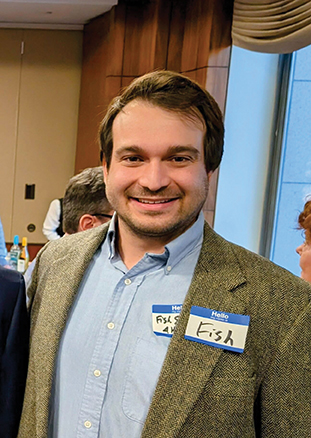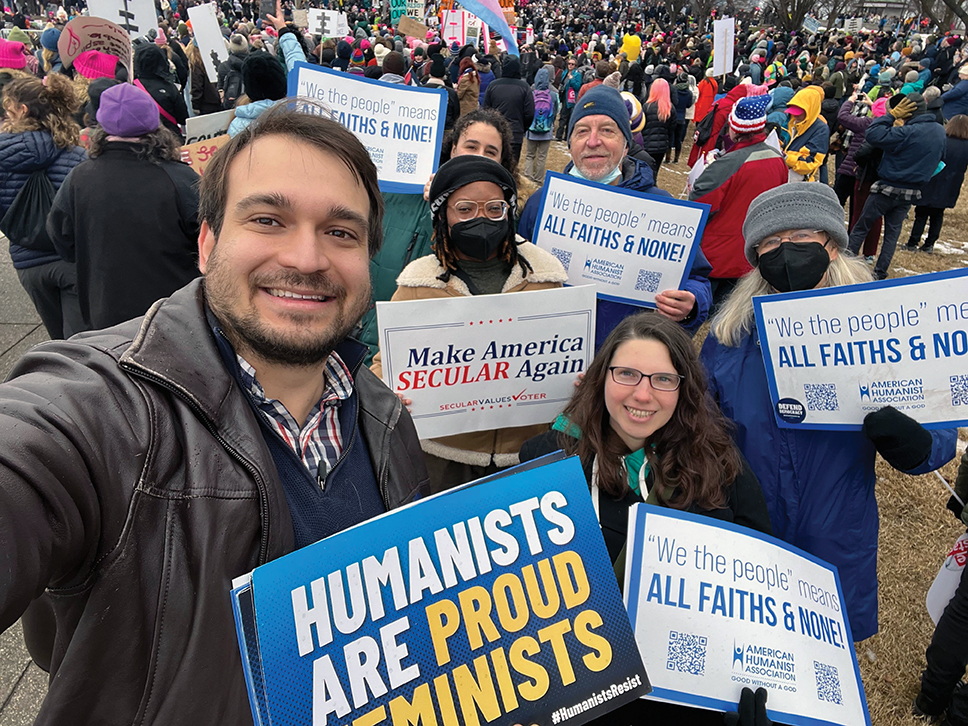Curing Loneliness: How Humanism Can Bring Us Closer Together

Fish Stark is the Executive Director of the American Humanist Association. This article is adapted from his remarks at the First Unitarian Society of Minneapolis.
“The most daring thing is to create stable communities in which the terrible disease of loneliness can be cured.”
—Kurt Vonnegut
AS THE EXECUTIVE DIRECTOR of the American Humanist Association, I find myself in the thrilling and challenging position of having to represent humanists and what they believe.
I say challenging because the beliefs of a group that prides itself on free-thinking are not easily summarized. There’s the old joke “two Jews, three opinions,” and our version of that is “two humanists, four and a half opinions and an epistemological debate on the nature of opinion to boot.”
I’ve tried saying that “if you believe in the Golden Rule but don’t really believe in God, you’re a humanist.” That we believe that what makes people special, important, worth fighting for, is not an immortal soul or intelligently designed body—but consciousness. Our capability to think independently, to imagine better futures for ourselves and our fellow humans, to build lives of meaning and purpose from the infinite canvas of a free mind. That we believe in people—in human goodness, human dignity, and human potential. That we believe there’s no problem people can’t solve, no truth we can’t uncover, as long as we live in communities that protect the right to think freely, and that this, our capacity to evolve from fish and build civilizations is all the miraculousness we need. That the difference, perhaps, between humanism and atheism is that atheism’s primary critique of Christianity is about the existence of God, and humanism’s primary critique of Christianity is about the existence of original sin, the notion of broken people needing to be saved or redeemed.
 But I also believe humanism is a practice. And that means, lately, I’ve been thinking a good deal about ritual. Because I believe people curious about humanism would rather hear what humanism calls us to do rather than what humanists think.
But I also believe humanism is a practice. And that means, lately, I’ve been thinking a good deal about ritual. Because I believe people curious about humanism would rather hear what humanism calls us to do rather than what humanists think.
They say “faith without works is dead,” and faithlessness without works is just arguing on Twitter.
If the Catholics have communion and Muslims have pilgrimages and Jews have bar and bat mitzvahs—what is it that we do that makes us humanist, and that breathes humanism into the world?
I’ve been reading an amazing book by Greg Epstein, the humanist chaplain at Harvard, and he quotes the religious historian Jonathan Z Smith, who talked about religious ritual as “a means of performing the way things ought to be in conscious tension to the way things are.”
Performing the way things ought to be in conscious tension to the way things are.
In an unjust and isolated world there are a hell of a lot of things we could perform differently. And that’s the great thing about humanism: we have always been a movement of people unafraid to imagine better, unwilling to be hemmed in by the present; by reality, sure, but always venturing to the edge of the possible.
“They say ‘faith without works is dead,’ and faithlessness without works is just arguing on Twitter.”
I’ve spent my career in what I call “applied humanism”—which others might call education. I did my academic tours of duty at Yale and Harvard, studying child psychology, but specifically how we come to develop our moral and ethical beliefs and how these give us a sense of purpose and well-being. As Vonnegut says, “we are only healthy to the extent our ideas are humane.”
 And I’ve spent my career asking the question: How can we build solutions to help people feel that they belong, and that they matter? I’ve spent the last decade building bullying prevention and school climate programs that helped kids feel safe in school, service learning programs that helped kids feel a sense of purpose and belonging within their community, a secular version of the Scouts where kids who didn’t feel at home anywhere else found a group that welcomed them in.
And I’ve spent my career asking the question: How can we build solutions to help people feel that they belong, and that they matter? I’ve spent the last decade building bullying prevention and school climate programs that helped kids feel safe in school, service learning programs that helped kids feel a sense of purpose and belonging within their community, a secular version of the Scouts where kids who didn’t feel at home anywhere else found a group that welcomed them in.
Because we talk a lot in the world of education and human capital about unleashing potential. About building a world where everyone is equipped to be their best self. And we often talk about it as a function of skills and attitudes. That if we just teach people the right ways to do things, they’ll flourish.
But what we know—what the humanistic psychologists from Dewey to Maslow have taught us—is that we can only reach true wellness, true flourishing, true potential, if we feel connected to others, a sense of purpose and meaning and value in our community.
I wonder, sometimes, if this is the practice of humanism. The recognition of the right of all people to matter and belong as an extension of their inherent value. And the active choice to welcome and include, to help others see the humanity in themselves and the common humanity between all of us.
I think about the feeling of falling in love.
My fiancé is an agnostic Jew and I’m a Unitarian secular humanist, which is what we call an interfaithless marriage.
She has enthusiastically embraced Unitarianism, although she hates the word “church” and still sometimes calls us “the island of misfit goys.”
And I remember the feeling—and many of you may remember this feeling, too—when I met her, of finally feeling known. And the wave of relief and joy that rushes over you when you realize: here, in an alienated and broken world, is someone who understands. Someone who sees the whole of me and opens their arms even wider.
It reminds me of how I felt when I realized there was a word for what I believed. That I was a humanist and that in so being I was connected to millions of incredible people like me, from people my age to historical heroes from Mark Twain to Frederick Douglass to Eleanor Roosevelt. I hope you’ll take a moment to imagine how that felt for you—realizing you weren’t the only one.
We often talk about “growing humanism.” But we don’t often talk about why it matters to popularize humanism, to share it and invite more people in. Because it’s not enough that we’re right. That’s not sufficient motivation, I think, to do the hard and vulnerable work of welcoming strangers.
We often talk about the worthiness and correctness of our cause more than the benefits that common belief and identity can offer to people searching for something to belong to and believe in. But the truth is people need humanism more than humanism needs people.
Because there are tens of millions of Americans who are both broadly secular and broadly progressive. Who believe, as we do, in human dignity and goodness and potential, in rationalism as the source of empirical truth and empathy as the source of moral truth.
And many of those tens of millions of Americans feel dispossessed in a world where our voices are diluted by racist political structures and money in politics, where our paycheck doesn’t go far enough. Feel disillusioned with the systems and movements they trusted to protect them. Feel alienated from their peers, distant from a purpose, unsure of their value outside of their achievements and their earning potential.
We’ve seen the statistics. Social isolation affects a third of Americans. Rates of anxiety and depression are spiking. The driving cause of mental health issues among young people is a lack of purpose and direction. Vivek Murthy has called loneliness an epidemic.
 Vonnegut says, “The most daring thing to do is to create stable communities in which the disease of loneliness can be cured.”
Vonnegut says, “The most daring thing to do is to create stable communities in which the disease of loneliness can be cured.”
But if it’s a disease, the antidotes are known. We know from the research of Dr. Kristin Neff, at UT Austin, about the power of common humanity to create well-being. That simply knowing there are things that connect you to other people—that you are not alone in your ideas and experiences—helps you feel valued and worthy. We know that one of the most important things for someone’s confidence is a stable self-concept: a set of core beliefs and a community you feel connected to, a greater “why” that allows us to experience the thrill and agency of acting with self-integrity.
In other words: if there are tens of millions of untapped humanists who are struggling because they don’t know where they belong, what they believe, or where they’re welcome, then this is not just an opportunity to grow our movement. It is also an opportunity to heal some of the deep brokenness in America, which feels like a tinderbox of alienation, a place where people increasingly feel their value to others is conditional and are putting up defenses accordingly.
As humanists, we’re pragmatic. We’re materialist. So it occurs to me I’ve gone on about as long as I should in talking about why we have an incredible opportunity and obligation to welcome new people into humanism and talk a little more about how.
To go back to Smith’s idea of ritual, what can we do to perform the way things ought to be—a world where people belong and are valued—in conscious tension to the way things are?
What could we do to make humanism the opposite of loneliness?
“ I hope you’ll take a moment to imagine how that felt for you—realizing you weren’t the only one.”
One thing is to recognize that people feel valued and curious when they see people fighting for them. As humanists, we’re no strangers to political action. We are the movement of Gloria Steinem and Jamie Raskin and Emma Goldman, who once brilliantly said “we only have as much liberty as we have the intelligence to want and the courage to take.”
We have to publicly connect our political and social action to our humanist beliefs. And rather than treating our beliefs as self-evident, to explain the humanist principles and the reasoning that underlies them, so that people don’t just understand what humanists think, but why they think it, and can build mental models for themselves of what it means to think humanistically.
Humanists love talking, but we do a lot of our talking to each other. And I’m convinced this is a time for us to embrace every tool at our disposal to talk broadly about humanism, not with the intent of convincing the people who disagree with us, but reminding the people who do agree with us that they have a home. To give people the gift that we’ve all experienced—of feeling for the first time there is a word for what you believe, that our counterculture of reason and empathy in an unreasonable and uncaring world connects us to millions of strangers.
And to do that we are going to have to talk to people not on our terms but on theirs. We need to resist the temptation to use our favorite proprietary terms and talk about the people’s aspirations and values and wounds in their words. In particular we need to talk much more about what we do believe than what we don’t believe, especially because of the thirty percent of Americans who are nonreligious, half are agnostic—not driven by a belief in the supernatural, but not comfortable committing to nonbelief as a first principle.
When I was working in the tech startup world we were building apps to help children build positive mental health before they entered middle school, where now, fifty percent of kids are experiencing some form of anxiety or depression in their teen years. We were building an app like Duolingo that children and their parents could use together every night to help build the basic skills of mental wellness and resilience. And we weren’t getting very far. We were especially struggling to attract customers of color and customers from immigrant communities.
“Welcoming others means, to a degree, accepting tension between their uniqueness and our own.”
And we realized that part of the problem was the language we were using. We were talking about the term I had been taught for this work at Harvard and Yale, which was social-emotional learning. And we were realizing that the language felt distinctly academic and disconnected from the aspirations that people, and especially people of color, had for their children. It wasn’t that they disagreed with what we were offering, but when we tried to explain it to them, we sounded like a foreign agent. So we did the work of, not just sitting with people in conversation, but gathering the data about how people, when they were asked to talk about it themselves, framed what they wanted and hoped for for their children. And we realized people talked about this sense of wellness and resilience not using words like “emotional wellness” or “social emotional learning,” but confidence.
We started using the word “confidence” in our marketing and saw incredible growth in demand for what we were offering. It reminded me of the power of stepping out of the comfort of language that is familiar and into the transcendence of language that truly connects. That this, too—understanding the language people use to talk about shared values, even if it’s not the language we recognize—is an act of recognizing humanity.
As Quinta Brunson, humanist and creator of my favorite TV show, Abbott Elementary, says: “everyday people just trying their best is so moving to me. It makes me emotional. When someone gets themselves out of bed and goes to work and makes a difference for a person who is having a hard day, or just waves at a person—those are moments to me that are godlike.”
We need to be comfortable claiming everyday excellence and altruism as acts of humanism, pointing out to people that humanism is something they’ve already been doing, rather than a hurdle they have to clear. Perhaps they’ve been doing it all of their life. People are thinking and living humanistically without knowing it. Imagine being the person to point it out to them.
To point out that people’s everyday acts of kindness and justice, their simple embrace of reason and compassion, connect them to a living tradition of some of our nation’s greatest thinkers and artists and leaders, constitutes an act of taking up the torch lit by people from Thomas Paine to Bill Nye, the Science Guy.
If there’s one thing I’m convinced of lately, it’s that people need to see themselves as heroes in the American story. And if there’s one thing we believe as humanists, it’s the capacity and the need for everyday heroes. Because we know that no one is coming to save us, and yet we’re still here, that we have everything it takes to save ourselves. That if we embrace our agency and honor our ethical obligations, that everyone has the worthiness and the wherewithal within them to change the world.
The work of curing loneliness, as Vonnegut says, is hard and vulnerable and disciplined work. Welcoming others means, to a degree, accepting tension between their uniqueness and our own. It means a loss of control. But it starts, I’m convinced, simply with everyday acts of recognizing the humanity of others.
And when we do this, as people sit in the joy of finally being understood, we can let them know that this—this is humanism.
